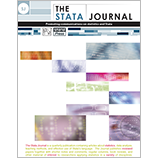Linear dynamic panel-data estimation using maximum likelihood and structural equation modeling
Richard Williams
University of Notre Dame
Department of Sociology
Notre Dame, IN
[email protected]
|
Paul D. Allison
University of Pennsylvania
Department of Sociology
Philadelphia, PA
[email protected]
|
Enrique Moral-Benito
Banco de España
Madrid, Spain
[email protected]
|
Abstract. Panel data make it possible both to control for unobserved confounders
and to include lagged, endogenous regressors. However, trying to do both simultaneously
leads to serious estimation difficulties. In the econometric literature, these
problems have been addressed by using lagged instrumental variables together
with the generalized method of moments, while in sociology the same problems
have been dealt with using maximum likelihood estimation and structural equation
modeling. While both approaches have merit, we show that the maximum
likelihood–structural equation models method is substantially more efficient than
the generalized method of moments method when the normality assumption is
met and that the former also suffers less from finite sample biases. We introduce
the command xtdpdml, which has syntax similar to other Stata commands for
linear dynamic panel-data estimation. xtdpdml greatly simplifies the structural
equation model specification process; makes it possible to test and relax many of
the constraints that are typically embodied in dynamic panel models; allows one
to include time-invariant variables in the model, unlike most related methods; and
takes advantage of Stata’s ability to use full-information maximum likelihood for
dealing with missing data. The strengths and advantages of xtdpdml are illustrated
via examples from both economics and sociology.
View all articles by these authors:
Richard Williams, Paul D. Allison, Enrique Moral-Benito
View all articles with these keywords:
xtdpdml, linear dynamic panel-data, structural equation modeling, maximum likelihood
Download citation: BibTeX RIS
Download citation and abstract: BibTeX RIS
|
